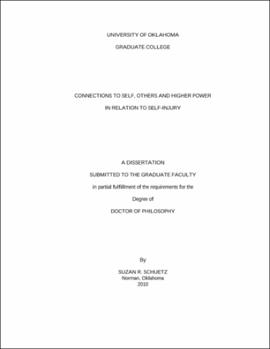| dc.contributor.advisor | Robbins, Rockey | |
| dc.creator | Schuetz, Suzan R. | |
| dc.date.accessioned | 2019-04-27T21:24:10Z | |
| dc.date.available | 2019-04-27T21:24:10Z | |
| dc.date.issued | 2010 | |
| dc.identifier | 99160415502042 | |
| dc.identifier.uri | https://hdl.handle.net/11244/318602 | |
| dc.description.abstract | Despite the growing attention to self-injury in non-clinical populations, college-age individuals have been underrepresented in the research. This study examined the role of connections to self, connections to others, and connections to higher power on propensity toward self-injury in a college population, from relational cultural and psychodynamic perspectives. Connection to self was measured by looking at alexithymia and attitude toward dreams; connection to others was measured by degree of interpersonal problems; and connection to higher power was measured by looking at spiritual transcendence. Alexithymia, interpersonal problems and positive attitude toward dreams were found to predict greater propensity toward self-injury, whereas spiritual connection was not. Students with alexithymia were found to have difficulties in interpersonal relationships and have more negative attitudes toward dreams. | |
| dc.format.extent | 114 pages | |
| dc.format.medium | application.pdf | |
| dc.language | en_US | |
| dc.relation.requires | Adobe Acrobat Reader | |
| dc.subject | Self-injurious behavior | |
| dc.subject | Self-mutilation | |
| dc.subject | College students--Mental health | |
| dc.title | Connections to Self, Others and Higher Power in Relation to Self-Injury | |
| dc.type | text | |
| dc.type | document | |
| dc.thesis.degree | Ph.D. | |
| ou.group | Jeannine Rainbolt College of Education::Department of Educational Psychology | |
